
Meteorology is a branch of the atmospheric sciences with a major focus on weather forecasting. The study of meteorology dates back millennia, though significant progress in meteorology did not begin until the 18th century. The 19th century saw modest progress in the field after weather observation networks were formed across broad regions. Prior attempts at prediction of weather depended on historical data. It was not until after the elucidation of the laws of physics, and more particularly in the latter half of the 20th century, the development of the computer that significant breakthroughs in weather forecasting were achieved. An important branch of weather forecasting is marine weather forecasting as it relates to maritime and coastal safety, in which weather effects also include atmospheric interactions with large bodies of water.

A meteorologist is a scientist who studies and works in the field of meteorology aiming to understand or predict Earth's atmospheric phenomena including the weather. Those who study meteorological phenomena are meteorologists in research, while those using mathematical models and knowledge to prepare daily weather forecasts are called weather forecasters or operational meteorologists.

The United States National Climatic Data Center (NCDC), previously known as the National Weather Records Center (NWRC), in Asheville, North Carolina, was the world's largest active archive of weather data.

The American Meteorological Society (AMS) is a scientific and professional organization in the United States promoting and disseminating information about the atmospheric, oceanic, and hydrologic sciences. Its mission is to advance the atmospheric and related sciences, technologies, applications, and services for the benefit of society.
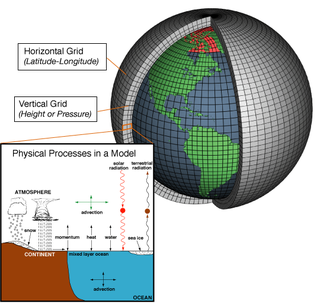
Numerical weather prediction (NWP) uses mathematical models of the atmosphere and oceans to predict the weather based on current weather conditions. Though first attempted in the 1920s, it was not until the advent of computer simulation in the 1950s that numerical weather predictions produced realistic results. A number of global and regional forecast models are run in different countries worldwide, using current weather observations relayed from radiosondes, weather satellites and other observing systems as inputs.
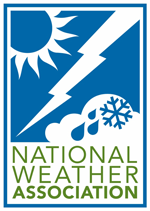
The National Weather Association (NWA), founded in 1975, is an American professional association with a mission to support and promote excellence in operational meteorology and related activities.
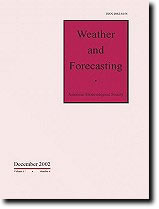
Weather and Forecasting is a scientific journal published by the American Meteorological Society. Articles on forecasting and analysis techniques, forecast verification studies, and case studies useful to forecasters. In addition, submissions that report on changes to the suite of operational numerical models and statistical post-processing techniques, and articles that demonstrate the transfer of research results to the forecasting community.
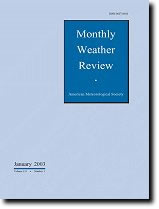
The Monthly Weather Review is a peer-reviewed scientific journal published by the American Meteorological Society. It covers research related to analysis and prediction of observed and modeled circulations of the atmosphere, including technique development, data assimilation, model validation, and relevant case studies. This includes papers on numerical techniques and data assimilation techniques that apply to the atmosphere and/or ocean environment. The current editor-in-chief is Ron McTaggart-Cowan.

The Danish Meteorological Institute is the official Danish meteorological institute, administrated by the Ministry of Climate, Energy and Utilities. It makes weather forecasts and observations for Denmark, Greenland, and the Faroe Islands.
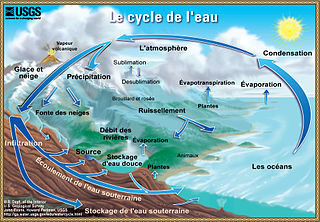
Hydrometeorology is a branch of meteorology and hydrology that studies the transfer of water and energy between the land surface and the lower atmosphere for academic research, commercial gain or operational forecasting purposes.
Roger Willis Daley was a British meteorologist known particularly for his work on data assimilation.

The Pakistan Meteorological Department (PMD) (Urdu: محکمہ موسمیات پاکستان, also known as Pakistan Met Office), is an autonomous and independent institution tasked with providing weather forecasts and public warnings concerning weather for protection, safety and general information.

Eugenia Enriqueta Kalnay was an Argentine meteorologist and a Distinguished University Professor of Atmospheric and Oceanic Science, which is part of the University of Maryland College of Computer, Mathematical, and Natural Sciences at the University of Maryland, College Park in the United States.
Anthony R. Lupo is a department chair and professor of atmospheric science at the University of Missouri. He became a member of the American Meteorological Society in 1987, Sigma Xi in 1992, the National Weather Association in 2000, is a former expert reviewer for the 2001 IPCC Third Assessment Report, and became a Fulbright Scholar in 2004. He is also a fellow of the Royal Meteorological Society and the editor-in-chief of the scientific journal National Weather Digest.
The North American Ensemble Forecast System (NAEFS) is a joint project involving the Meteorological Service of Canada (MSC) in Canada, the National Weather Service (NWS) in the United States, and the National Meteorological Service of Mexico (NMSM) in Mexico providing numerical weather prediction ensemble guidance for the 1- to 16-day forecast period. The NAEFS combines the Canadian MSC and the US NWS global ensemble prediction systems, improving probabilistic operational guidance over what can be built from any individual country's ensemble. Model guidance from the NAEFS is incorporated into the forecasts of the respective national agencies.
The International Meteorological Organization Prize is awarded annually by the World Meteorological Organization (WMO) for outstanding contributions in the field of meteorology and, since 1971, the field of operational hydrology.

The Coordination Group for Meteorological Satellites (CGMS) is an international organization created in 1972 to coordinate the satellite systems that support global operational meteorology.
A weather drone, or weather-sensing uncrewed aerial vehicle (UAV), – is a remotely piloted aircraft weighing less than 25 kg and carrying sensors that collect thermodynamic and kinematic data from the mid and lower atmosphere.












